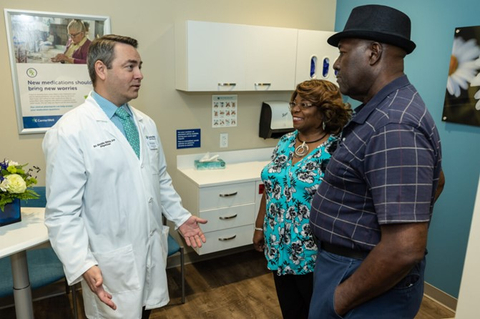New Study from Humana Healthcare Research and Harvard University Reveals Better Access to Primary Care for Seniors Receiving Care from Senior-Focused Primary Care Organizations
In collaboration with a leading researcher and professor at Harvard University, Humana’s first-of-its-kind study found better access to primary care and narrowed racial and socio-economic disparities for those receiving care from senior-focused primary care organizations.

Humana Inc., one of the nation’s leading health and well-being companies, recently published a study on senior-focused primary care — a value-based care model that tailors the environment and services of clinical organizations to the unique needs of older adults. Published in Health Affairs, this study is the first of its size and scope in analyzing this type of organization. This joint study, conducted in partnership with a leading researcher and professor at Harvard University, found better access to primary care for patients of senior-focused primary care organizations compared to other types of primary care organizations like the traditional fee-for-service model. (Photo: Business Wire)
“We know that increasing access to primary care services is critical to our efforts to deliver better health outcomes for our patients,” said Dr. Kate Goodrich, Humana’s Chief Medical Officer. “This first-of-its-kind study shows that patients in senior-focused primary care organizations had better access to care, and that’s important because it informs our efforts to effectively address the needs of seniors, many of whom have chronic conditions and complex needs. Of note, it showed even larger benefits for Black and low-income patients, reducing health disparities. All those things are good news for our patients, and this study demonstrates that the senior-focused primary care model is working.”
Today’s primary care healthcare system often fails to meet the needs of seniors, many of whom have both chronic conditions and complex care needs. The traditional primary care system that primarily operates in fee-for-service arrangements with insurers can be difficult to access and is often more reactive than proactive. Alternatively, senior-focused primary care organizations operate within a value-based care model supported predominantly by population-based payment contracts with Medicare Advantage. This payment arrangement, enabled by current CMS payment policies, provides the infrastructure, flexibility, and financial incentives for senior-focused primary care organizations to provide tailored, holistic, coordinated, and proactive care to older adults, particularly historically underserved populations. Senior-focused primary care organizations offer longer appointment times, same-day appointments when needed and access to on-site teams of doctors, nurses, pharmacists, social workers, behavioral health specialists and referral specialists who provide a wide range of extended services to meet the comprehensive needs of seniors.
In collaboration with a leading researcher and professor at Harvard University, the Humana Healthcare Research team analyzed data across six different senior-focused primary care organizations and on more than 462,000 patients enrolled in Medicare Advantage in 2021 to compare healthcare service use and quality of care between those that were and were not patients of senior-focused primary care organizations. The main takeaways validate primary care providers’ long-term investment in integrated senior care services, including for example, Humana’s owned senior-focused primary care brands, CenterWell Senior Primary Care and Conviva Care Center.
Relative to more traditional primary care settings, patients of value-based, senior-focused primary care organizations had
"This study bears out what we see day-to-day in our approximately 300 centers, many of them located in underserved areas,” said Reneé Buckingham, president of Humana’s senior-focused primary care organization. “Focusing on seniors in a value-based, team-oriented care model means that we can spend more time with patients, understanding the many social and other factors that play a role in overall health. It’s that deep knowledge of our patients that drives these better outcomes. In fact, this data proves what we’ve known for some time – senior-focused primary care improves well-being so those under our care can attain their best health and live their lives to the fullest. Increasing access to senior-focused primary care is an important lever in delivering better health outcomes for our members and patients.”
You can access the full study on the Health Affairs website.
About Humana
Humana Inc. is committed to putting health first – for our teammates, our customers, and our company. Through our Humana insurance services, and our CenterWell health care services, we strive to make it easier for the millions of people we serve to achieve their best health – delivering the care and service they need, when they need it. These efforts are leading to a better quality of life for people with Medicare, Medicaid, families, individuals, military service personnel, and communities at large. Learn more about what we offer at Humana.com and at CenterWell.com.
View source version on businesswire.com: https://www.businesswire.com/news/home/20240904301644/en/
Sara Nelson
Humana Corporate Communications
Snelson31@humana.com
Kevin Smith
Humana Corporate Communications
Ksmith305@humana.com
Source: Humana Inc.







